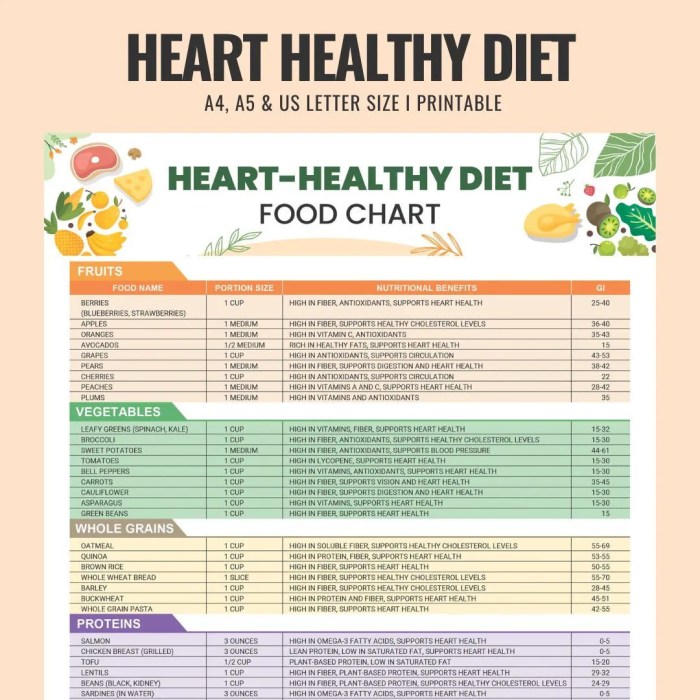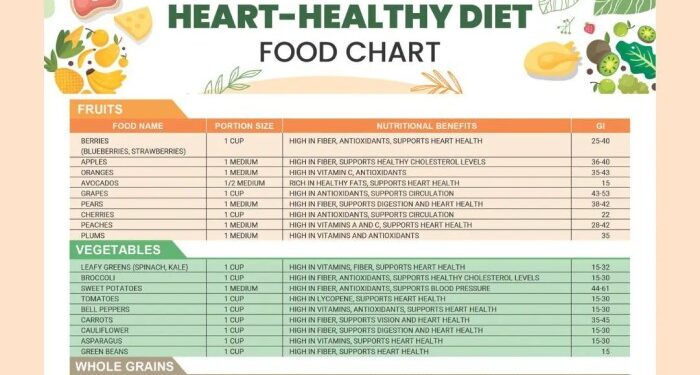Top nutrition plans for heart health set the foundation for a journey through the intricacies of maintaining a healthy heart. From understanding the significance of proper nutrition to exploring key components of a heart-healthy diet, this guide offers valuable insights for enhancing overall cardiovascular well-being.
Delve deeper into the world of heart-healthy nutrition with a breakdown of fats, the role of fiber, and practical tips for creating nutritious meals. Let's embark on this enlightening exploration together.
Importance of Nutrition for Heart Health
Proper nutrition is crucial for maintaining heart health as it directly impacts the risk of developing heart diseases. A balanced diet that includes essential nutrients can help prevent various cardiovascular conditions and promote overall well-being.
Examples of Nutrients Essential for Heart Health
- Omega-3 fatty acids: Found in fish, flaxseeds, and walnuts, omega-3 fatty acids help reduce inflammation and lower the risk of heart disease.
- Antioxidants: Rich in fruits and vegetables, antioxidants like vitamin C and E can protect the heart by neutralizing free radicals that cause damage to cells.
- Fiber: Whole grains, legumes, and fruits are excellent sources of fiber, which can help lower cholesterol levels and maintain a healthy heart.
- Potassium: Foods like bananas, sweet potatoes, and spinach are high in potassium, which helps regulate blood pressure and support heart function.
How a Balanced Diet Can Prevent Heart Diseases
A balanced diet that includes a variety of nutrients is essential for preventing heart diseases. By incorporating foods rich in omega-3 fatty acids, antioxidants, fiber, and potassium, individuals can lower their risk of developing conditions such as high blood pressure, atherosclerosis, and heart attacks.
Key Components of a Heart-Healthy Diet
Eating a heart-healthy diet is crucial for maintaining cardiovascular health and reducing the risk of heart disease. Incorporating specific foods into your daily meals can have a significant impact on your overall well-being.
Benefits of Including Fruits and Vegetables
Including a variety of fruits and vegetables in your diet provides essential nutrients, vitamins, and antioxidants that support heart health. These foods are low in calories and high in fiber, helping to maintain a healthy weight and reduce cholesterol levels.
Aim to fill half your plate with colorful fruits and vegetables to ensure you are getting a good mix of nutrients.
Role of Whole Grains and Lean Proteins
Whole grains, such as brown rice, quinoa, and whole wheat bread, are rich in fiber and can help lower cholesterol levels and reduce the risk of heart disease. Lean proteins like poultry, fish, and legumes are excellent sources of protein without the excess saturated fats found in red meats.
Incorporating these foods into your diet can help promote heart health and overall well-being.
Impact of Fats on Heart Health
The type and amount of fats consumed play a crucial role in heart health. Understanding the difference between good fats and bad fats is essential in maintaining a healthy heart.
Good Fats vs. Bad Fats
- Good fats, such as monounsaturated and polyunsaturated fats, can help lower bad cholesterol levels in the blood, reducing the risk of heart disease.
- Bad fats, like saturated fats and trans fats, can raise bad cholesterol levels, increasing the risk of heart disease and stroke.
Omega-3 Fatty Acids
Omega-3 fatty acids are a type of polyunsaturated fat that is particularly beneficial for heart health. They help reduce inflammation, lower triglyceride levels, decrease blood pressure, and improve overall heart function.
Sources of Healthy Fats
- Fatty fish such as salmon, mackerel, and sardines are rich in omega-3 fatty acids and are excellent choices for a heart-healthy diet.
- Nuts and seeds like almonds, walnuts, chia seeds, and flaxseeds are also good sources of healthy fats.
- Avocados, olive oil, and olives are examples of foods high in monounsaturated fats, which can help improve heart health.
Role of Fiber in Heart Health
Fiber plays a crucial role in maintaining heart health by helping to lower cholesterol levels, regulate blood sugar levels, and promote overall digestive health.
Benefits of Soluble and Insoluble Fiber for the Heart
Soluble fiber helps to lower LDL (bad) cholesterol levels in the blood, which can reduce the risk of heart disease. On the other hand, insoluble fiber adds bulk to the stool, promoting regular bowel movements and preventing constipation, which can indirectly benefit heart health by reducing inflammation in the body.
List of Fiber-rich Foods Beneficial for Heart Health
- Whole grains such as oats, barley, and quinoa
- Fruits like apples, berries, and oranges
- Vegetables such as broccoli, carrots, and Brussels sprouts
- Legumes like beans, lentils, and chickpeas
- Nuts and seeds including almonds, chia seeds, and flaxseeds
Recommended Nutrition Plans for Heart Health
Having a heart-healthy diet is crucial for maintaining overall cardiovascular health. Here is a sample heart-healthy meal plan for a day:
Sample Heart-Healthy Meal Plan
- Breakfast: Oatmeal with fresh berries and a sprinkle of flaxseeds
- Snack: Greek yogurt with sliced almonds
- Lunch: Grilled chicken salad with mixed greens and vinaigrette dressing
- Snack: Carrot sticks with hummus
- Dinner: Baked salmon with quinoa and steamed broccoli
Portion control is key when following a heart-healthy diet. It's important to pay attention to serving sizes to avoid overeating, which can lead to weight gain and other health issues.
Tips for Adapting Recipes
- Use olive oil or avocado oil instead of butter for cooking
- Replace salt with herbs and spices for flavor
- Choose lean proteins like chicken, fish, and legumes
- Incorporate more fruits and vegetables into your meals
Final Summary

As we conclude this exploration of top nutrition plans for heart health, remember that small dietary changes can have a significant impact on your heart's well-being. By incorporating these guidelines into your lifestyle, you are taking proactive steps towards a healthier heart and a happier life.
Key Questions Answered
What role does portion control play in a heart-healthy diet?
Portion control is crucial in managing calorie intake and maintaining a healthy weight, both of which are essential for heart health. By monitoring portion sizes, you can prevent overeating and ensure balanced nutrition.
How can recipes be adapted to make them more heart-friendly?
Recipes can be made more heart-friendly by reducing salt, sugar, and unhealthy fats, while increasing the use of herbs, spices, and healthier cooking methods like grilling or baking. Choosing lean proteins and whole grains also enhances the heart-healthy nature of dishes.
Why are omega-3 fatty acids important for heart health?
Omega-3 fatty acids are known to reduce inflammation, decrease the risk of blood clots, and lower blood pressure, all of which contribute to a healthier heart. Incorporating sources of omega-3s like fatty fish, flaxseeds, and walnuts can benefit heart health.



